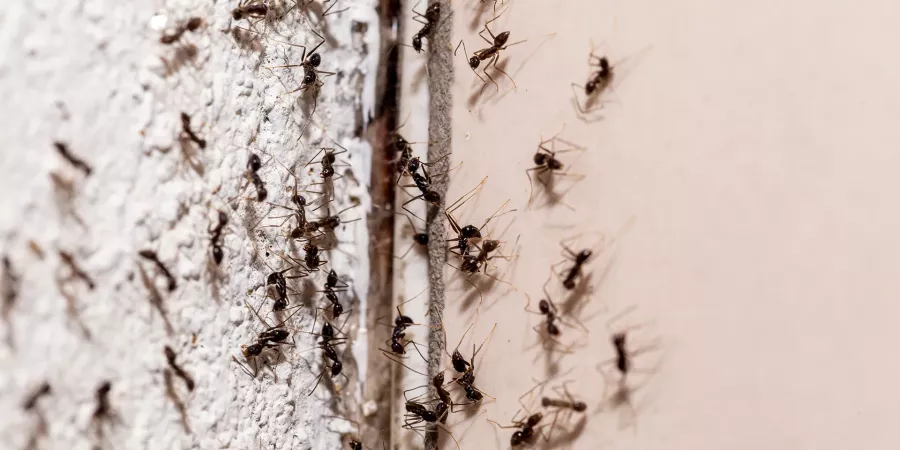How to get rid of ants in your home or apartment: prevention and natural remedies

Despite their small size, ants can become a serious problem in living spaces. Their intrusion is a common issue faced by many households throughout the year. If you spot one ant in your home, it’s almost certainly a scout searching for food, indicating a nearby colony. In this text, you'll learn about safe and natural ways to get rid of these unwanted guests.
Keep food out of ants' reach
The primary reason ants invade your home is food. Focus on your kitchen by thoroughly cleaning it and removing all food sources that might attract ants. This includes jars of honey or jam, which are particularly appealing to these insects, as well as food remnants on countertops, crumbs, or trash if it is easily accessible.
Food containers should be sealed tightly, and avoid leaving open drink cans for too long as their smell can attract ants, especially if you already have an ant problem. Wash dishes immediately after use or place them in the dishwasher to prevent food residues from remaining for extended periods.
Interested in how to keep your living space clean and healthy? We covered this topic in one of our previous blog posts.
Identify ant 'entrances' to your home
Once you’ve ensured there are no food sources attracting ants, it’s important to identify and seal possible entry points. This involves a thorough inspection of your yard, entry doors, and windows if you live on the ground floor. Even if your apartment is on higher floors, ants can still visit, so check for cracks in walls or window frames and seal any suspicious gaps.
Ants are most commonly found in the kitchen, where they easily access food. However, it’s not unusual to find them in the bathroom as well, where moist conditions promote their spread, making mold and ants a common combination.
Preventive measures are the same — regular cleaning and sealing potential ant entry points.
Natural methods for repelling ants
Some natural ingredients that you may already have in your kitchen can be effective ant repellents without posing risks of poisoning or allergic reactions to people and pets. This is important, as we tend to use strong chemical cleaners. However, don’t underestimate the power of easily available products that have been used for this purpose for centuries.
If you notice ants gathering in your home and feel it's time for a 'counterattack,' use these ingredients that you likely already have in your kitchen. These substances act differently on ants: some repel them due to their smell, while others can be attractive but harmful to them. Here is a list of such products for you to choose what works best in your home. Many of these tips also offer additional benefits beyond repelling ants and can serve as general advice for refreshing and naturally disinfecting your living space.
Cinnamon: Cinnamon essential oil or a mixture of water with this sweet spice product has been proven to repel ants due to its antiseptic and antiparasitic properties while providing a pleasant and soothing scent indoors. Additionally, cinnamon is a great ingredient to include in your diet.
Citrus fruits: These fruits are unpleasant to ants due to their acidity and chemical composition, so placing lemon or grapefruit peels near an ant nest can be very effective. Their high acidity and specific smell repel ants.
Coffee grounds: Since ants dislike the smell of ground coffee, they will keep their distance. Of course, the coffee should not contain sugar, as this could have the opposite effect.
Chalk: Calcium carbonate in chalk acts as a natural ant repellent. You can draw thick lines with chalk on surfaces where you suspect ants are passing, creating a barrier they will avoid. However, this method is impractical for all surfaces in the home, especially if they are hard to reach or unsuitable for drawing.
Vinegar: A mixture of vinegar and water is effective against ants similarly to citrus fruits. Its sharp smell and acidity repel ants, making them less likely to form colonies in your home. Regularly spray this combination on critical areas in your house.
Table salt: Mix a few tablespoons of table salt with boiling water and, after cooling, apply it to suspected openings. Its crystalline structure and composition repel ants, preventing their entry into your home and their presence inside.
Baking soda: Baking soda is often a solution for all household problems, including ant control. Apply it directly to surfaces where ants gather and vacuum it up after a few days.
Borax or sodium tetraborate: This white powdery mineral has been used for decades as a cleaning agent and is effective against mold, fungi, and insects. Its toxicity to ants makes it effective in destroying colonies and preventing their return to your home.
Pepper: Since ants search for sugar in your kitchen, the taste of pepper will surprise them and indicate that there is nothing they are looking for nearby.
Cornmeal: Cornmeal can be another effective remedy for ants. Ants will eat the cornmeal, but their digestive system cannot process the starch, which is fatal to them.
Annoying yet fascinating insects
If we don’t view them solely as parasites in our homes, we see that ants are actually incredibly interesting insects with one of the most complex social structures. In every colony, there is a hierarchy, with the queen at the center. She is responsible for reproduction and can live up to 15 years. Alongside her are worker ants, performing various tasks within the colony, including building anthills, caring for young members, and gathering food. Following them are so-called soldier ants, which protect the colony’s territorial boundaries and guard it from potential threats, while males have the sole purpose of mating with the queen. This organization allows ants to effectively exist in various environments around the world.
Where do ants live?
In our areas, ants will settle in any convenient location — in the ground, trees, walls, or building foundations, to name a few. These insects can inhabit any living space and enter through the smallest cracks in search of food sources. They seek out food remnants in the kitchen or pantry, attracted by sweet and fatty substances. They communicate effectively with each other, leaving pheromone trails that guide other ants.
Their colonies can consist of 300,000 to 500,000 individuals. If you’ve ever encountered an ant colony in your home, you know that these persistent insects won’t disappear on their own, especially considering that mentioned ants can live up to 15 years. This means they won’t vanish until you address the root cause of their presence.
Beneficial to the ecosystem but undesirable in spaces
Ants are beneficial creatures that play a significant role in the ecosystem. However, their presence in a human living space is highly undesirable. These insects can transfer various pathogenic microorganisms, dirt, dust, etc., which can lead to the spread of diseases. This also applies to their work, which many residents complain about when they damage and destroy wooden structures, furniture, or household items. These harmful consequences should prompt you to find and eliminate the reasons ants might enter your home, as well as seek solutions to get rid of them as soon as possible.
Prevention and follow-up actions
Eliminating ants is not always a quick solution. Remember, they have a complex social structure and an extensive colony. Even if you remove visible ants, their nest may be located elsewhere, and you may see a new generation returning to the scene. Therefore, use all the methods we’ve listed to prevent their return.
Using these natural solutions will help keep your home or apartment free from ants while avoiding the impact of strong chemicals and side effects that could be harmful to health. With prevention and natural methods, you can create a healthier and more comfortable living environment.


